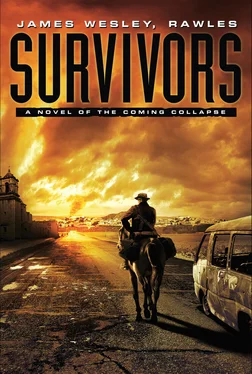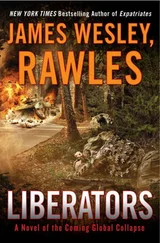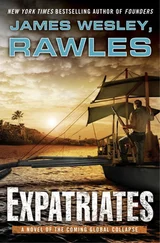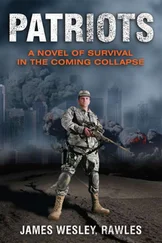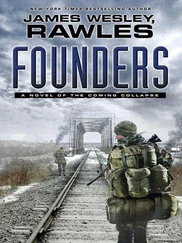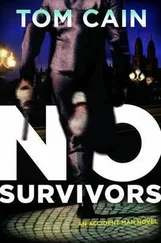Andy immediately turned and delivered a rapid series of baton strikes to the chest and arms of the other motorcyclist, who was slow in dismounting. Overwhelmed, he gunned his engine and sped off. Seeing Andy’s furious show of force, the first biker jumped back aboard his Kawasaki and sped away unsteadily, shouting curses. As he picked up his fallen bicycle and inspected both it and the trailer hitch for damage, Laine muttered to himself, “There must be some international college of thuggery that teaches the bike-spokes technique.”
22. A Semblance of Normalcy
“During the hyperinflation in post WWI Germany, what used to be a comfortable nest egg was suddenly the value of a postage stamp. If one held just a portion of their savings in precious metals, the crisis was greatly softened. Gold will never be worth nothing, even if the exact price fluctuates. There is a famous photograph, however, of a German woman during this time period burning piles of tightly bound banknotes to keep warm.”
— Congressman Ron Paul
In better weather, another day of cycling the minor roads north from Dover brought Andy to the quintessentially Kentish town of Boughton, just short of the town of Faversham. He spent the night in the woods, just off the road from Boughton to Hernhill, uneventfully. After breakfast and a shave the next morning, he cycled back to the main road. Andy felt like he was deep in the heart of the land of thatched roofs and tweed jackets. At Faversham he turned down to the yacht harbor at Oare Creek. Laine was surprised to see such a large number of private sailboats and motor vessels in the harbor.
Although he was first met with suspicion at the harbormaster’s office, he was eventually given a safe place to leave his bicycle and trailer, while he scoured the docks to make inquiries.
He arrived at low tide, with the water so low that most of the boats were resting on their keels in the mud, looking forlorn. The harbormaster explained that it was an unusual “minus tide.”
In a series of conversations, Laine was told that there were three boat sailings expected within the next week: one bound for New Zealand, one for Tasmania, and one for Belize. There were no vessels of any description that they had heard of bound for the United States this winter. Andy sat down on a seagull-splattered bench and prayed. After ten minutes of fervent prayer, he returned to the motor-cruiser where they seemed the best-informed about the upcoming sailings. Asking about the boat headed for Belize, he was told: “Second or third slip from the end on the last dock. Look for a big Tayana: she’s called the Durobrabis .” Andy only had a vague recollection that Belize was formerly called British Honduras and that it was close to Mexico. He couldn’t remember if there was another country in between. To Andy, the Central American countries, other than Panama, were just a jumble on the map.
Laine went to the dock as instructed and found a middle-aged man and woman transferring supplies from a cart onto the sailboat. It was a forty-eight-footer, and looked well cared for. Most of the other sailboats in the harbor were in trim form for intermittent casual recreational use, but in contrast, Durobrabis had some bulky items lashed to its foredeck, covered with brown tarps. Andy recognized the distinct blue color of water cooler bottles beneath one of these tarps. The slightly overweight gray-haired man was wearing a T-shirt emblazoned “Hollowshore Cruising Club” under an open windbreaker. As Andy approached the boat, the man stepped away from the cart, pulled a long kitchen knife from under his jacket and held it at his side, and ordered: “Stop right there!” Andy immediately halted twenty-five feet away and showed his palms.
The man’s wife stood speechless, still holding two sacks of groceries. She looked terrified.
“We’ve been blagged before, and we won’t be again,” the man declared intensely.
“Sir, I can assure you, I’m no robber. My name’s Andrew Laine. I’m an American Army officer, looking to buy passage to Belize. I heard you were headed there.”
“That’s right, but we’re full up. Your money’s no good here, Yank.”
Andy said imploringly, “But I can pay you in gold .”
The yacht skipper blinked, but then said, “Sorry, but what good is gold to me? The family that’s going with us, they stocked up piles of food and fuel months ago, so they’re supplying us with nearly all the provisions-enough for the whole journey. Right now, that’s worth a lot more to me than gold. We can’t eat gold.”
“Well, then, what about lead?”
“What?” the man replied, sounding confused.
“I deal in lead, friend.”
The boat captain laughed nervously and cocked his head.
Laine continued, “I’m willing to wager that you don’t have much more than that knife to protect yourself and all onboard. So I’d like to make you an offer: to provide you with some more substantial security for your voyage as a working crew member.”
“Have you ever crewed a yacht?”
“No, but I’m willing to learn, and I’m very good with a gun.”
“That’s all well and good, but you won’t find a gun to be had in all of England, at any price.”
“I’m willing to offer you mine , and a steady, well-trained hand behind it.” He patted the jacket at the small of his back.
The man still looked hesitant.
Speaking slowly, Laine added: “Look, I really am an Army officer with six years of experience. I’ve done tours in both Iraq and Afghanistan. I’m a good Christian man. And importantly for you, I know how to make cutthroats of all descriptions either drop dead in their tracks or turn and run, crying like babies. I’ve been in some very tight spots, so I know exactly how to get out of them. Trust me.”
The old man looked toward his wife and they nodded to each other. Turning back toward Andy, he said, “Come aboard and we’ll parlay.”
Carston Simms, the skipper of Durobrabis , filled Andy in about both the yacht and his background. Simms had served in the Royal Navy as an enlisted seaman for six years, back in the late 1970s. Soon after, he got a degree in psychology and worked as a school counselor and later as a private school administrator. He used the yacht on his long summer vacations. They had two sons, who had both emigrated to Australia twenty years before. Laine got the impression that Simms had strained relations with his sons, since he bluntly described them as “layabout alcoholics.” Simms had lost his job in the recession that began in 2008, which caused private-school enrollments to plummet.
Simms spent a while expressing his concerns about the deteriorating conditions in England. He predicted a massive die-off because the island nation was so dependent on food and fuel from overseas. He put on a grim face and said: “They’ll be eating each other in London and Colchester in just a few weeks. We’ve got to get someplace with a better climate and less population.”
They sat in the boat’s saloon area. The surroundings were heavy on teak and stainless steel, which was unfamiliar to Andy but pleasant. Carston Simms and his wife, Angie, seemed nervous and chatty. Before agreeing to take Laine on as crew, they spent a half hour quizzing Andy about his background, education, and experience. Here, Andy’s DD-214 discharge papers came in handy. Finally, Simms wanted to see the SIG pistol. Pointing it upward, Andy deftly unloaded it. He then field-stripped and reassembled it on the saloon table. This particularly impressed Angie.
Then Carston began to open up about the situation on the boat and their plans to sail for Belize. Andy was nearly right about the Carstons’ kitchen knife. Other than a few small knives and an Olin flare pistol, they were unarmed. The skipper habitually called the single-shot 12-gauge flare gun his “Very” pistol, which Andy thought sounded quaintly First World War. Simms conceded that they’d be easy pickings for pirates without Andy and a real gun.
Читать дальше
